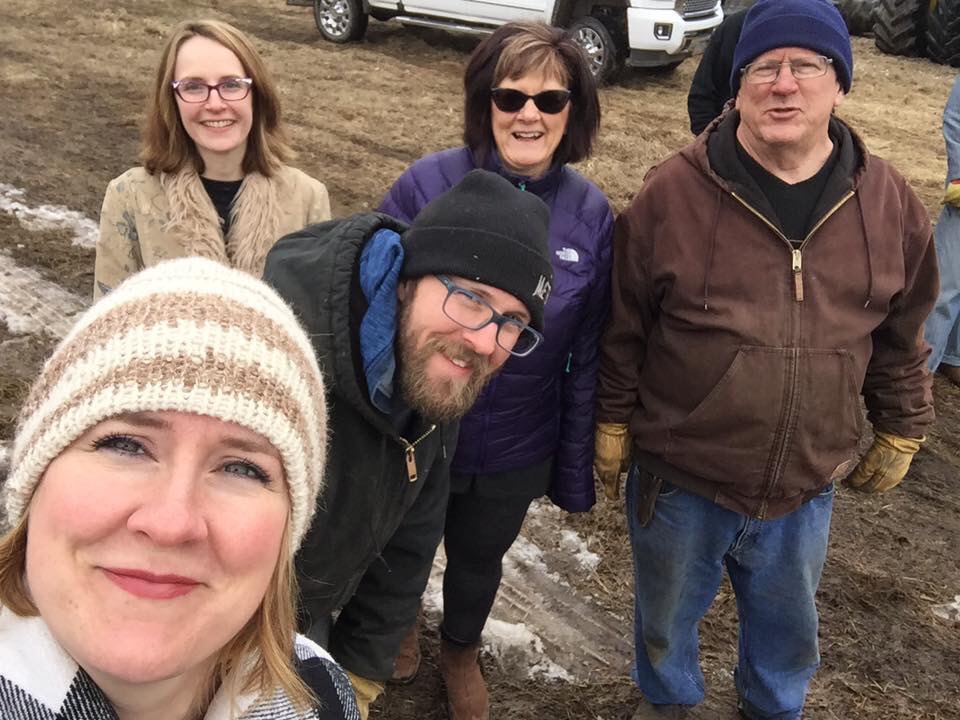 By Tracie Bettenhausen | Submitted Photos
By Tracie Bettenhausen | Submitted Photos
I was pumping my skinny knob knees up and down, one then the other, messy brown hair flapping like a cape. The pink-and-white bicycle my steed, and the narrow bit of sky ahead my ring of fire. I don’t remember ever riding so fast, hurtling toward the space between the corner of my dad’s shop and a big wooden pole. I don’t know what made me want to slip through that chute, but I remember the exhilaration that must’ve lasted less than 10 seconds and ended with a zap-zap, zap-zap.
I forgot there was a wire electric fence stretched across that space. I raced full speed into it. I panicked, shocks of light surging through my seven-year old muscles. My dad must’ve seen what would happen just as I was about to hit, because he was there in a flash. He pulled me in a bear hug away from the wire, chuckling a little, “whoa whoa whoa.”
Standing in front of my dad’s shop, five feet and 30 years away from that memory, my dad was hauling stuff for sale. The way this farm auction worked, the initial 30 minutes were for the little items to be sold to the folks who made the drive to this farm on the highway west of Wishek, North Dakota. The rest of the auction would occur both live on-site and online. A modern marvel for farm auctions, when farms are growing larger and farm families spaced farther apart.
My parents were auctioning the stuff on the farmstead. The house and land it sat on were already sold to a young neighbor excited to start his life. He had even agreed to care for the cats who sat on the porch and in a backyard tree, like birds.
Later, Dad would tell me it was strange the way those first items were sold; some of it was valuable, but not like that, and not to that crowd. Who wants a five gallon bucket full of wrenches? I agreed, as I looked around at a shop that still seemed full of tools collected over 40 years of farming.
“Girls, come look at this. You guys, look.” Mom was staring wide-eyed to the east of our farmstead at the neighboring open field. The 1988 drought had shriveled crops where they stood, but weeds like thistles were gifted a survival instinct for harsh conditions. When those thistles grew bulbous, woody, and proud, and tumbled in a strong North Dakota wind like they were born to do, the effect was surreal. Tumbleweeds were rolling across the prairie in unison, covering every foot we could see to the horizon. “I wish I could get video,” my mom said. The shelter belt behind our house was packed full of tumbleweeds.
The tumbleweeds were 10 feet high, and it took more than a decade for them to fully crumble down to the ground.
Standing in front of that shelterbelt many drought years and wet years later, a line-up of John Deere tractors, sprayers, semi trucks, and tire kickers packed down the snow. The auctioneer had started selling items online for a crowd that spanned the state and beyond. A major snowfall meant lots of standing water, and the air was cool and damp. “Could be worse,” we all agreed. My mom came outside for this part. She wanted to see off her favorite pick-up, a red 1990 Chevy, and the funny little Spra-Coupe.
I was sitting in the driver’s seat of that red pickup when it was less than 10 years old, laughing so hard I couldn’t push the gas pedal. My brother was in the passenger’s seat, telling me to stop. My dad, standing beside the Spra-Coupe, was getting madder and madder that I couldn’t stop laughing. This was one of those summers where my job for a few weeks was to wait by the side of the field and read while my dad sprayed the crops. When he hit a patch of mud the Spra-Coupe couldn’t conquer, he’d call me on the two-way radio, “Lyle to Tracie,” and give directions for how to get to him in a way so that I wouldn’t get stuck and could pull him out. Sometimes, the giggles were an additional natural disaster.
Dad had to climb up into each piece of equipment to start it, so the crowd could see if it ran. Eventually, he had my brother do this job, because he thought “everybody was looking at him weird.” I couldn’t blame him. It was a bit of a spectacle; a series of motions he was so used to doing in the shop, in a field, on a section line, spectator-free.
To take that first high knee step, swing up the second leg, and keep climbing, then swing open the door and slide into the bouncy seat, it’s like a dance you know to perfection but have never done on stage.
“Do you think you’ll miss farming?” I ask Dad weeks later.
“Tracie, it’s just a job like every other job,” he answered.
It seems like this can’t be true, when a family’s memories are so wound around the place and way of life.
But a young neighbor told me on auction day that my parents were serving as good role models.
“They’re showing us you don’t need to work until you can’t work any more,” he said.
The farm will remain in that spot, along the highway, possibly for the rest of all of our earthly lives. There is room at the end of a life well-farmed for more: routines to develop new dances, time to see new marvels, space to race toward new adventure.
 Tracie Bettenhausen is a senior staff writer/editor at Basin Electric. She has generously opened her home to two once-foster, now-adopted kitties, Basil and Sweet Pea.
Tracie Bettenhausen is a senior staff writer/editor at Basin Electric. She has generously opened her home to two once-foster, now-adopted kitties, Basil and Sweet Pea.
